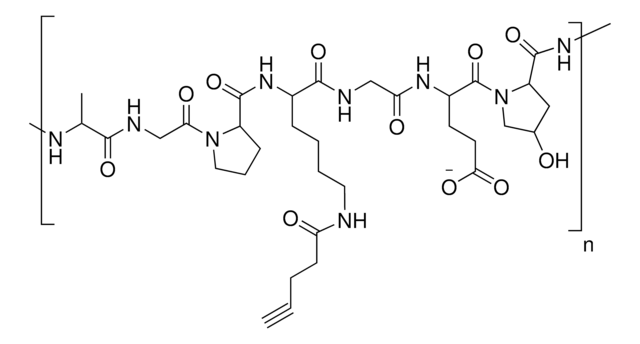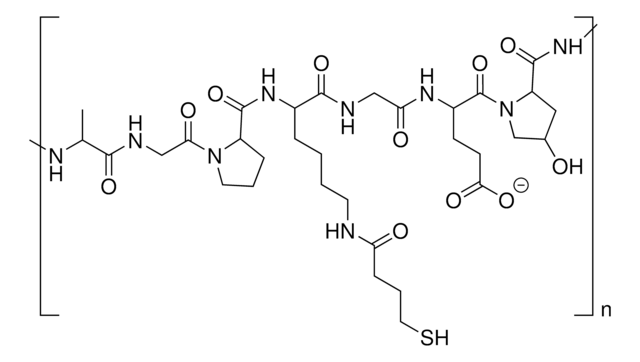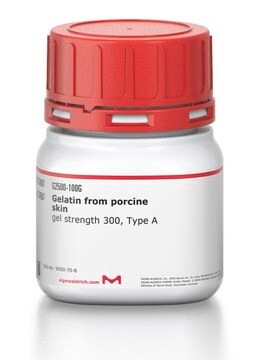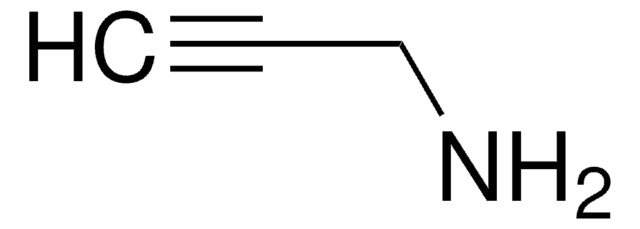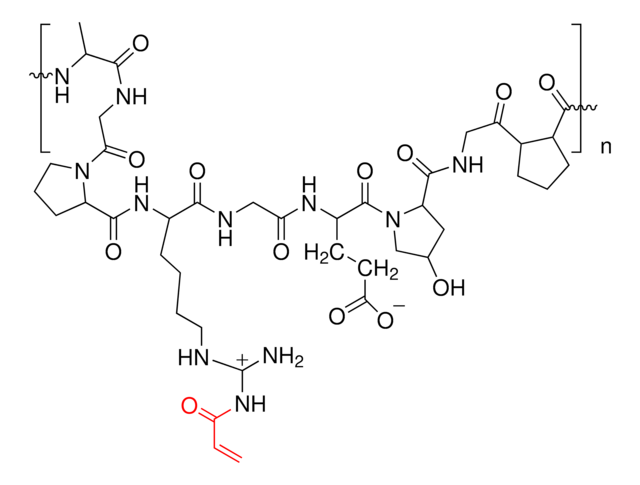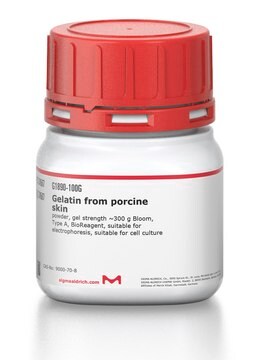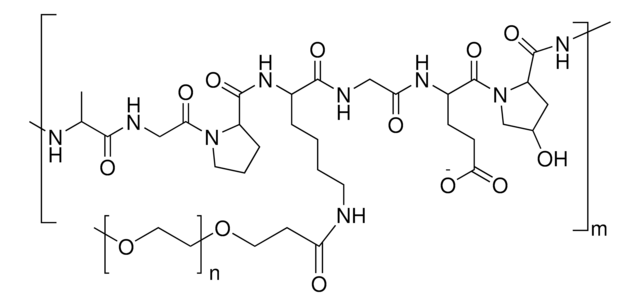907723
Azide functionalized gelatin
degree of substitution >80%
Sinônimo(s):
Azide functionlized gelatin, Azide-modified gelatin, Clickable gelatin
Faça loginpara ver os preços organizacionais e de contrato
About This Item
Código UNSPSC:
12352125
NACRES:
NA.23
Produtos recomendados
descrição
Degree of substitution: greater than 80% by TNBS method
NMR: Conforms to structure
Formulário
powder
cor
white to pale yellow
temperatura de armazenamento
−20°C
Categorias relacionadas
Descrição geral
Due to its biodegradablity and biocompatibility, gelatin is routinely used in hydrogels for biomedical applications such as drug delivery, tissue engineering, and 3D bioprinting. Gelatin-based hydrogels are synthesized by the crosslinking of functionalized gelatins. Depending on the identity of the functional groups, several different processes can be used to synthesize crosslinked gelatin hydrogels, including radical-based (either thermal or photochemical) and click chemistry methods. Azide-functionalized gelatin can be used in the synthesis of hydrogels using click chemistry with alkyne-containing substrates.
Código de classe de armazenamento
11 - Combustible Solids
Classe de risco de água (WGK)
WGK 3
Ponto de fulgor (°F)
Not applicable
Ponto de fulgor (°C)
Not applicable
Escolha uma das versões mais recentes:
Certificados de análise (COA)
Lot/Batch Number
Não está vendo a versão correta?
Se precisar de uma versão específica, você pode procurar um certificado específico pelo número do lote ou da remessa.
Já possui este produto?
Encontre a documentação dos produtos que você adquiriu recentemente na biblioteca de documentos.
Gelatin hydrogels via thiol-ene chemistry
Russo L, et al.
Monatshefte fur Chemie / Chemical Monthly, 147, 587-592 (2016)
Vinh X Truong et al.
Biomacromolecules, 16(7), 2246-2253 (2015-06-10)
In this study, we present a method for the fabrication of in situ forming gelatin and poly(ethylene glycol)-based hydrogels utilizing bioorthogonal, strain-promoted alkyne-azide cycloaddition as the cross-linking reaction. By incorporating nitrobenzyl moieties within the network structure, these hydrogels can be
Thiol-yne `click?/coupling chemistry and recent applications in polymer and materials synthesis and modification.
Andrew B. Lowe
Polymer, 55 (2014)
Sandeep T Koshy et al.
Advanced healthcare materials, 5(5), 541-547 (2016-01-26)
Injectable gelatin hydrogels formed with bioorthogonal click chemistry (ClickGel) are cell-responsive ECM mimics for in vitro and in vivo biomaterials applications. Gelatin polymers with pendant norbornene (GelN) or tetrazine (GelT) groups can quickly and spontaneously crosslink upon mixing, allowing for
Masato Tamura et al.
Scientific reports, 5, 15060-15060 (2015-10-10)
This paper describes the generation of "click-crosslinkable" and "photodegaradable" gelatin hydrogels from the reaction between dibenzocycloctyl-terminated photoclevable tetra-arm polyethylene glycol and azide-modified gelatin. The hydrogels were formed in 30 min through the click-crosslinking reaction. The micropatterned features in the hydrogels were
Nossa equipe de cientistas tem experiência em todas as áreas de pesquisa, incluindo Life Sciences, ciência de materiais, síntese química, cromatografia, química analítica e muitas outras.
Entre em contato com a assistência técnica